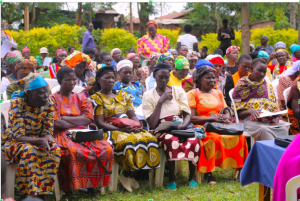The Quiet Paradox of Partnership When the Grassroots Win
There is a paradox that many grassroots organizations like Rona Foundation quietly live through. We are often celebrated as the “nice-to-have” in donor portfolios — the small, good-looking community partners who bring color and human stories to polished grant reports. We are held up as the beating heart of social change — until we actually make it beat louder.
And then, suddenly, the applause softens.
Because what happens when such organizations achieve the unthinkable — when “small” breaks through systems that long resisted change?
What happens when a widow-led movement from a small county — one of forty-seven, with a population under two million in a country of fifty-four million — achieves the extraordinary: the enactment of the Siaya Widows Protection Bill (2025), the first of its kind in Kenya and across East Africa?
For us at Rona Foundation, that milestone took 13 years of advocacy, countless voices and tears, and immeasurable faith. It is not just a law; it is a living testament that widows, once invisible, can now be seen — and protected.
It outlaws harmful traditional practices, affirms widows’ bodily autonomy and freedom from degrading rituals, and recognizes widowhood as a social identity deserving dignity, justice, and equal participation in community life.
Yet as we stand at this historic intersection, we find ourselves grappling with a new kind of paradox — one that sits quietly between success, scalability, and the enduring pursuit of sustainability.
Like many who have watched our rise with both pride and curiosity, we had imagined that passing a law to protect widows — a group long omitted from Kenya’s 62 years of independence and development narratives — would be the moment when partners rally to scale up the work.
It is the opposite —and a moment that invites unexpected reflection.
As we now find ourselves confronted with new questions — the kind that compel us to rethink how we function, and why. We are asked:-
“What does this law mean in practice?”
“How do you scale it?”
“What’s your innovative model?”
These are fair and important questions — ones that reveal the beautiful complexity of change.
Because outlawing deeply entrenched cultural practices is not a product to package or a “model” to replicate on demand. It is a journey of hearts, mindsets, and systems — and that takes time.
Even so, laws must now learn to live in villages, as envisaged by Devolution — Kenya’s system of governance that transfers power and resources from the national government to county governments. They must find space in council meetings, in homesteads, in widow groups under mango trees. The real success is not the paper signed in the Assembly; it is the widow who dares to say, “No, I will not be forcefully cleansed or inherited.” And that transformation is generational — not transactional.
Of note, widowhood has long suffered what I call the sin of omission — not an act of malice, but of invisibility born from centuries of silence and neglect. The absence of widows in data, policy, and funding frameworks is deafening. It is not that people don’t care; it is that they don’t see it as a human rights issue worthy of dignified ‘voice’ and investment.
And yet, when visibility finally arrives — through a milestone policy reform such as the Widows Protection Bill— it becomes almost too complex, too political, too human for frameworks that prefer clean, quantifiable results. And that reality has hit home.
True grassroots organizations like ours sit in that in-between space: too human for economics, too strategic for charity, and too local for big data.
So perhaps my question is not rhetorical: In today’s funding frameworks, what does it mean to center dignity and rights — when the outcome is a law, not a product?
In hindsight, we are learning that success changes your relationship with those who once believed in your smallness. That scaling justice is not the same as scaling a business model. That when widows rise, systems must follow — and systems take time.
We are not asking for applause. We are asking for allies.
Here we are — at the crossroads between celebration and continuation, between victory and vigilance. The law is passed — yes — but its soul must now be breathed into life. Counties must adopt it. Communities must own it. Generations must inherit it.
To our partners, old and new: walk with us. Not just as funders of projects, but as co-creators of change. Help us build a Kenya — an Africa — where widowhood transitions from marginalization to empowerment and purpose.
For in truth, the true measure of social change lies not in the size of an organization, but in the depth of its impact on humanity — impact that endures across generations.
And that, I believe, is something truly worth growing together.
Roseline Orwa, a widow champion, and the Founder and Executive Director of the Rona Foundation, a Kenyan widow human rights organization. She tweets @roselineorwa



